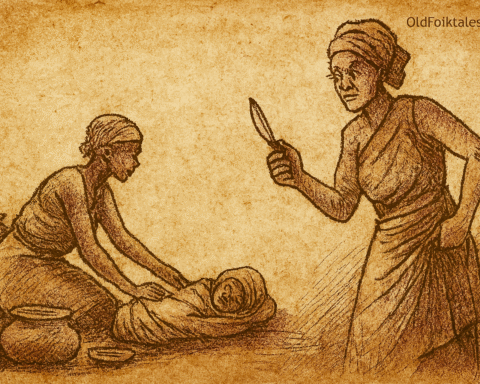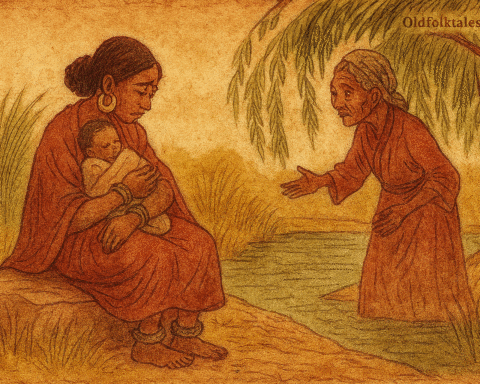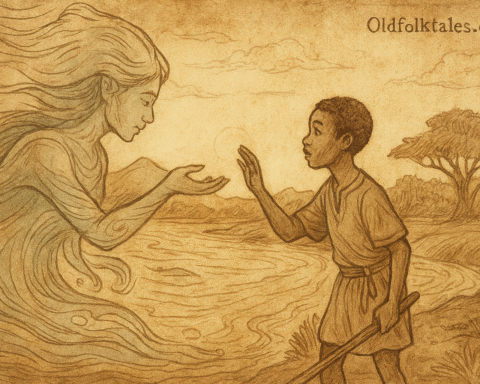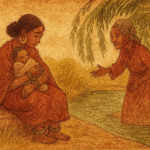In the days when the world was young and the rivers still sang new songs, a small village stood by the banks of the Osun River. The people worked in the day and rested at night, but one creature stayed awake long after the village slept. This was Olókunrin, the frog, whose croak echoed across the water whenever the moon rose in the sky.
Olókunrin was not an ordinary frog. His green skin shone brighter than wet leaves, and his eyes glimmered like polished stones. Yet his heart was filled with pride. He believed that no one, neither man nor beast, could match his voice or his beauty. Every night, when the moon climbed high, he would puff his throat and sing loud songs to himself, believing the moon listened only to him.
One evening, while the moon glowed brighter than usual, Olókunrin leapt onto a smooth rock in the middle of the river. He saw the moon’s reflection rippling in the water, more beautiful than anything he had ever seen. Her round face glowed like warm palm oil in the firelight, and her silver light kissed the river’s surface. At that moment, Olókunrin became jealous. “Why should the moon shine brighter than me?” he thought. “I will find her secret and make her beauty mine.”
The frog decided to call out to the moon. “Great Moon in the sky,” he croaked, “tell me how you shine so brightly, so that all may admire you as they admire me.” The moon, wise and patient, looked down and smiled. “Little frog,” she said, “beauty is not something you take. It is the reflection of what is inside. If you wish to shine, you must learn to listen more than you speak.”
Olókunrin did not understand. “I am already the finest singer in the land,” he replied. “Surely I only need your secret light to be complete.” The moon’s smile faded. “If you try to take what is not yours, you may lose what you already have.” But the frog’s pride was too great.
The very next night, Olókunrin leapt higher than he had ever jumped before, trying to reach the moon. He landed in the river and swam to where her reflection lay. Thinking it was the real moon, he dived in to catch it. But the more he tried, the more the water churned and scattered her image. Still, he refused to stop.
The river spirit, Osun, had been watching. She rose from the depths, her voice as soft as a flowing stream yet filled with power. “Why do you disturb my waters, little frog?” she asked. Olókunrin puffed his chest. “I am the greatest singer and the most handsome creature here. I will take the moon’s beauty and make it mine.”
Osun’s eyes darkened. “You speak of taking what belongs to the heavens. Pride has clouded your heart. If you do not leave these waters in peace, you will learn a lesson you will never forget.” But Olókunrin ignored her warning. He dived once more, reaching for the light in the water.
With a sigh, Osun lifted her hand, and the current swirled into a whirlpool. The frog found himself pulled under, tumbling in the dark. He struggled and kicked, but the water spun him around like a leaf in a storm. When at last the current released him, he was not at the river’s center but in a quiet pool far from the village. The moon still shone above, but her reflection seemed dimmer now, and Olókunrin’s voice was hoarse from his struggle.
Days passed, and the frog could no longer sing as before. His once-bright skin had dulled, and no creature came to listen to him. Alone and humbled, he remembered the moon’s words: beauty comes from within. He began to spend his nights listening to the songs of crickets, the rustle of leaves, and the gentle flow of water. Slowly, his voice returned, but this time his songs were softer, filled with the wisdom of what he had learned.
One clear night, the moon appeared again. “You have changed, little frog,” she said. “You no longer try to take what is not yours.” Olókunrin bowed his head. “I see now that your beauty is in your kindness and patience. My songs are better when they are shared, not shouted.” The moon smiled once more, and for the first time, her light seemed to rest gently on his back, not as a prize but as a blessing.
From then on, Olókunrin sang for the joy of it, not for praise. The villagers noticed that his songs sounded sweeter, and they said the frog’s voice carried the peace of the moonlit river.
Moral Lesson of The Frog and the Moon
Pride can blind the heart, and jealousy can drown the spirit. True beauty is not something you can steal or demand. It grows when you learn to listen, to respect others, and to share what you have without seeking glory. When the heart is humble, even the smallest voice can shine like the moon.
Knowledge Check
- What is the main lesson of The Frog and the Moon?
The story teaches that true beauty and worth come from humility and kindness, not from pride or jealousy. - Why did Olókunrin want the moon’s beauty?
He was jealous of her brightness and wanted to be admired more than any other creature. - How did the moon respond to Olókunrin’s request?
She told him that beauty comes from within and cannot be taken by force. - What role did the river spirit Osun play in the story?
She warned Olókunrin about his pride and punished him when he refused to listen. - How did Olókunrin change after his experience in the whirlpool?
He became humble, listened more, and sang for joy rather than for praise. - What does the moon’s final blessing to Olókunrin represent?
It symbolizes the reward of humility and the peace that comes from inner growth.
Cultural Origin
This folktale is rooted in Yoruba oral storytelling traditions from southwestern Nigeria, where rivers, the moon, and natural spirits play central roles in teaching moral lessons through nature and myth.






